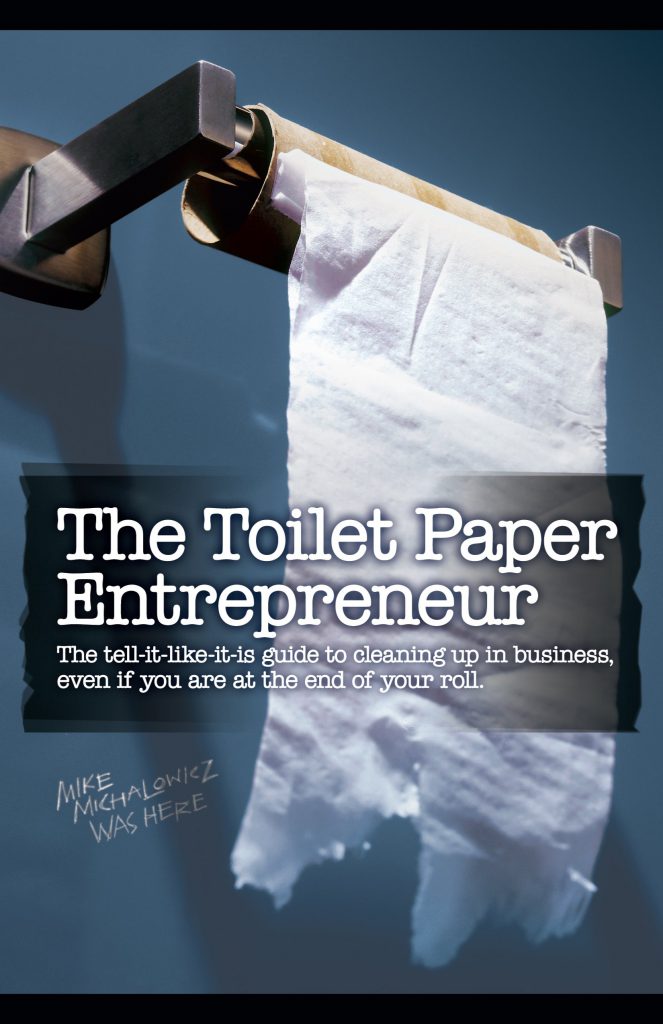 The Toilet Paper Entrepreneur by Mike Michalowicz is an irreverent guide to getting a business up and running without the formal advantages most other business books assume you’ll have. The title comes from that moment in the bathroom when you realize you’re down to the last few sheets of toilet paper a little too late. The “Toilet Paper Entrepreneur” finds a way to clean up with those few sheets, and whatever else they have available. Everyone else… uh, has a mess on their hands. Yes, there are a lot of potty jokes.
The Toilet Paper Entrepreneur by Mike Michalowicz is an irreverent guide to getting a business up and running without the formal advantages most other business books assume you’ll have. The title comes from that moment in the bathroom when you realize you’re down to the last few sheets of toilet paper a little too late. The “Toilet Paper Entrepreneur” finds a way to clean up with those few sheets, and whatever else they have available. Everyone else… uh, has a mess on their hands. Yes, there are a lot of potty jokes.
I picked up the TPE after reading another book by Michalowicz, Profit First. I absolutely loved Profit First. It was a game changer for me and completely transformed my relationship to business finances. It was also light hearted and amusing, so when that book came to an end, I went ahead and bought this one to read next.
Perhaps I’m simply too far along in my business journey, but unfortunately, the TPE just wasn’t as good. What the book is really about is breaking the conventional rules of business to succeed, but it’s freshest contribution is its attitude; one of shamelessness and outside the box thinking.
The book is a kind of beginning to end guide, and something like the E-Myth, where its goal is not just to help you understand what to do but how you can expect to feel about it along the way. Hint: When you’re sitting on the pot and there’s only three sheets of toilet paper left, generally you don’t feel good. Though you might feel good about pulling it off with just those three sheets.
The book begins in the dreaming phase of starting a business. That is to say, what business should you start, what you want out of it, how you want to feel about it. Michalowicz wants budding entrepreneurs to not just think about being successful, but how they’ll be successful, what excuses are keeping them from getting started, and what limiting beliefs exist that stunt them once they do.
Michalowicz, much as he did in Profit First, throws out conventional wisdom around business planning. Instead of starting with financing, business plans and legal documents, start with your values; Why, how and what matters to you. This helps you find a niche that’s right for you. The ‘business plan’, as it’s popularly understood, is eschewed in favor of a “prosperity plan” which is looser. The business plan is rarely revisited or updated, but the prosperity plan is a living document that grows and changes along with the business. This concept sits right with me–I’ve never revised my business plan, and I am now miles away from what I wrote all those years ago.
Michalowicz spends too much time going into the tried and true topics of ideal customers, saying no to people who a re not your ideal customers and finding friends and colleagues who will keep you accountable. Nothing to see here, move right along. As the book is winding down, the TPE gets into how to go about operating on a shoestring budget, and gives an overview of the Michalowicz’s Profit First concept. Unfortunately, having read Profit First, the chapter isn’t robust enough to be really useful.
All in all, it’s not a bad book with bad advice. It’s just advice you’ve probably heard before, just with more bathroom jokes. Perhaps I would feel differently about it had I picked it up three or four years ago. Today, it reads a little like an echo chamber. If you’re new in business, or thinking you’ll be starting a business, it’s probably a good book. Certainly more entertaining than The E-Myth.

Recent Discussion